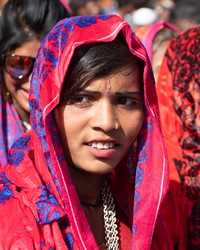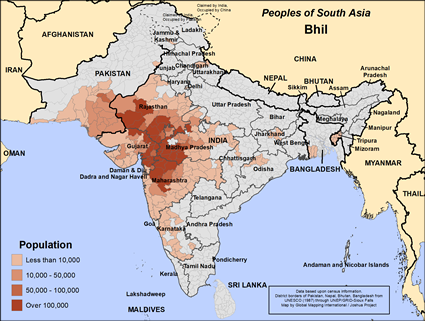Bhil unspecified in India

Photo Source:
Copyrighted © 2026
Arun Sambhu Mishra - Shutterstock All rights reserved. Used with permission |

Map Source:
People Group data: Omid. Map geography: UNESCO / GMI. Map Design: Joshua Project
|
| People Name: | Bhil unspecified |
| Country: | India |
| 10/40 Window: | Yes |
| Population: | 20,519,000 |
| World Population: | 21,142,000 |
| Primary Language: | Gujarati |
| Primary Religion: | Hinduism |
| Christian Adherents: | 0.76 % |
| Evangelicals: | 0.00 % |
| Scripture: | Complete Bible |
| Ministry Resources: | Yes |
| Jesus Film: | Yes |
| Audio Recordings: | Yes |
| People Cluster: | South Asia Tribal - Bhil |
| Affinity Bloc: | South Asian Peoples |
| Progress Level: |
|
Introduction / History
The Bhil are the third largest and most widely distributed tribal group in India. Although the Bhil were once thought of as a single tribe, it is now clear that they consist of many subgroups. There are two basic divisions of Bhil: the Central or "pure" Bhil, and the Eastern or part-Rajput Bhil. The Central Bhil live in the mountain regions of India, particularly in the states of Madhya Pradesh, Gujarat and Rajasthan. The name "Bhil" was probably derived from the word villu or billu, which in most Dravidian languages is the word for "bow. " The bow has long been a characteristic weapon of the Bhil because the tribesmen always carry their bows and arrows with them. Many years ago, Bhil rajas (kings) permitted immigrants from the plains to settle in the hill regions. To safeguard their independence and rule, the Bhil fought against powerful Empires: the Moghals, the Maratha and the British Raj. The Bhils are labeled a "scheduled tribe," meaning that they have low status. Being part of a scheduled tribe means that they are given special privileges. Their language, Bhili, is a blend of Gujarati and Marathi, the two major languages in their region.
What Are Their Lives Like?
The Bhil tribes inhabit some of the most remote and inaccessible areas of India. Unfortunately, their scattered settlement pattern has hindered government efforts to provide services for the people. It has also facilitated their general distrust of government officials which is already thin since they have a long history of rebelling against powerful outside forces.
What Are Their Beliefs?
Almost all Bhils practice ethnic religions that have been highly influenced by Hinduism. They accept Shiva as their supreme god. Along with Hindu practices, they worship their deceased ancestors. They call upon shamans to offer sacrifices to their many gods and idols. Most of their Hindu and traditional practices are so intertwined that it is difficult to separate them. In the Hindu religious system, this is acceptable since they do not have a set of dogmas like Islam or Christianity.
What Are Their Needs?
There are three segregated classes: the Bhagat Bhil, the ordinary Bhil, and the lowest class-the Christian Bhil. To accept Christ is like becoming an outcast in Bhil society.
Prayer Points
Pray for the Bhil people to have hearts that are open to the abundant blessings of Jesus Christ. Pray for Bhil families to prosper financially and spiritually as they experience a relationship with Jesus Christ. Pray for a movement among the Bhils that will spread joy, peace and salvation to other peoples in Rajasthan. Pray for the Bhil culture to be renewed and enhanced by a work of the Holy Spirit and shaped into a God-centered and God-honoring mold.